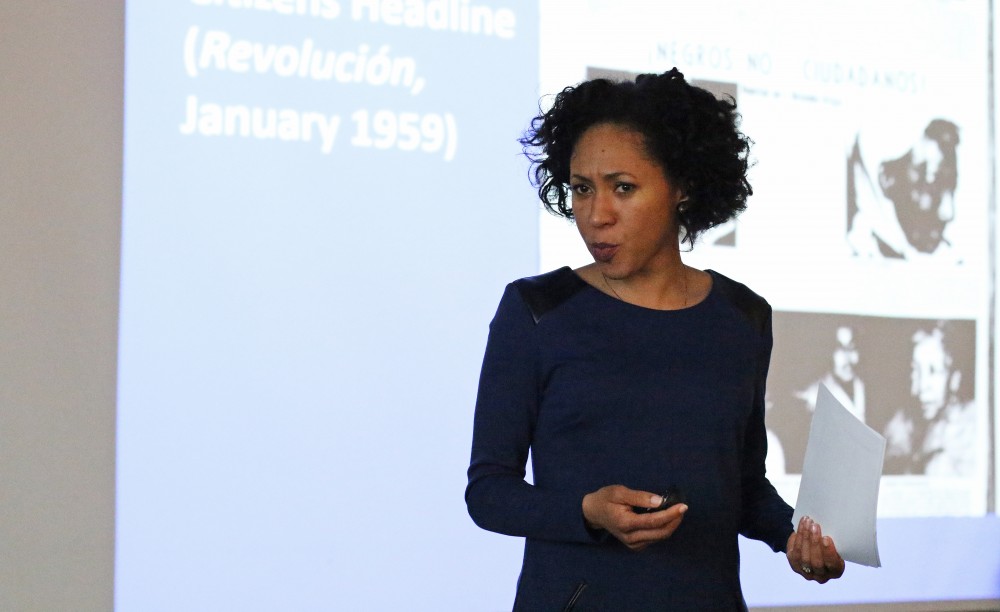Talking about race

GVL/ Hannah Zajac – Devyn Spence Benson speaks to students about her lecture on Antiracism in Cuba: The Unfinished Revolution, in the Kirkoff Center on Tuesday, Feb. 7, 2017.
Feb 9, 2017
How people view race and treat others based on their race continues to be a topic of heated discussion in today’s political climate. Across the United States, people are engaging in passionate dialogue and demonstrations to communicate their opinions and ideas about the state of race relations.
The U.S. is not the only country to be affected by conflicting views of race. In her lecture “Antiracism in Cuba: The Unfinished Revolution,” Devyn Spence Benson, assistant professor of Africana and Latin American studies at Davidson College, discussed the ongoing issue of race in Cuba, basing her discussion on the country’s history of viewing and treating race. The lecture, which was hosted by GVSU’s Latin American and Latino/a studies, African/African-American studies and the history department, was held Tuesday, Feb. 7, in the Kirkhof Center.
In her lecture, based on her book of the same name, Spence Benson argued that racism and antiracism have simultaneously existed in Cuba since Fidel Castro’s campaign to eliminate the distinction between white Cubans and Afro-Cubans.
In particular, Spence Benson said while Cuba was outwardly superior to the United States in terms of viewing and treating race in the mid-20th century (there were no explicit Jim Crow-style segregation laws, for example), implicit racism persisted. Even with Castro’s outward expressions of acceptance, racist attitudes were apparent in various outlets, including, Spence Benson noted, political cartoons, which often portrayed Afro-Cubans in a childlike or animalistic manner.
In addition, Spence Benson said with the economic crash in Cuba in the 1990s, the disparity between economic opportunities for white Cubans and Afro-Cubans became increasingly apparent, despite the seemingly positive, progressive race relations of the 1980s.
“Everyone starts talking about the return of racism (in the 1990s),” Spence Benson said. “What happened to racism? Racism didn’t disappear; it doesn’t return. If anything, ever since 1959, there has been the coexistence of racism and antiracism.”
Spence Benson also argued that the concept behind Castro’s campaign to eliminate the concept of race and forge a national Cuban identity was rife with contradictions and provided a way to negate individuals’ experiences with racism. By insisting that racism no longer existed at the close of the antidiscrimination campaign, which Spence Benson said was concluded too early, Castro effectively shut down the opportunity for individuals to complain about continued racism without fear of being subjected to punitive measures.
Spence Benson said this colorblind, ‘raceless’ attitude was appropriated from the 19th century and had been used to negate individuals’ experiences with racism in the past.
“That same ideology has been used to silence black activists when they tried to speak up,” Spence Benson said. “How radical can ‘racelessness’ be if it’s been used to silence Afro-Cubans who spoke up for themselves?”
David Stark, a professor of Latin American and Latino/a studies at GVSU who helped organize the event, thinks the topic of racism is timely given recent political events and the current social climate in the U.S., both nationally and locally.
“We like to think that maybe we’re past the issue of racism when we elect an African-American president, but then there are incidents of racism on campus,” Stark said. “Those incidents are very subtle, and sometimes people are reluctant to come forward about them, and so maybe by raising awareness of racism that still exists somewhere else, who knows, maybe it will empower people to come forward or to maybe take a stand and say, ‘We’re not going to allow this here on our campus.’”
Stark also said inviting Spence Benson to speak about themes from her book was in keeping with GVSU’s broader goals.
“One of our missions at Grand Valley is to transform students or help them become global citizens, and so this is part of that mission to help people become global citizens to become aware of events that are going on outside of the local area, the local West Michigan area, Michigan or even the United States,” he said.
Stark said he hoped attendees left the event with “a greater willingness (to) tackle issues that make (people) uncomfortable.”
“Maybe we don’t talk about (racism) because we’re uncomfortable with it,” he said. “I think that we still have a long way to go, and so if we can create a dialogue, if we can create a space in which people are comfortable (talking) about these issues, I’m not going to say that we’re going to solve the problem, but we can’t continue to pretend that the problem doesn’t exist.”























